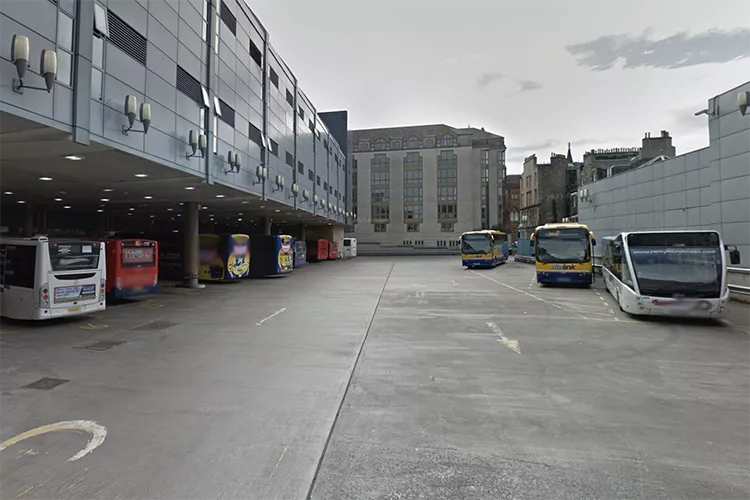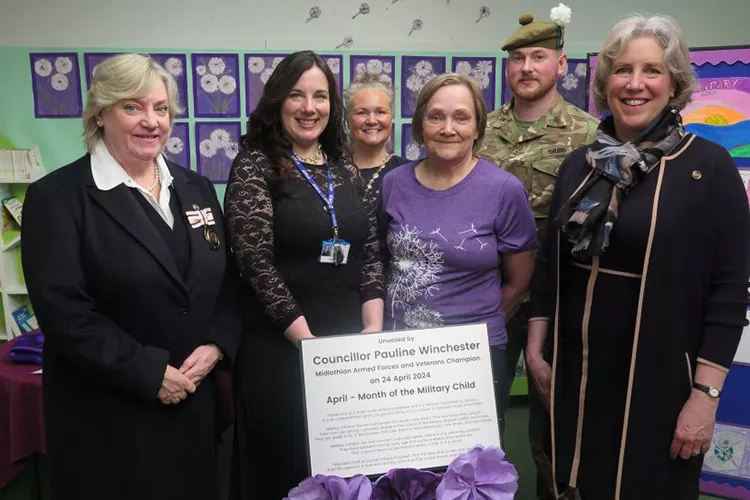
The future of Edinburgh Bus Station is hanging in the balance as its owners could attempt to redevelop the city centre site, it is understood.
The council has been told its lease of the station will not be renewed beyond 2027 and currently has no replacement identified, according to sources.
Transport convener Scott Arthur said be was “disappointed that such a modern and well used piece of Edinburgh’s substitutable transport infrastructure may be lost”.
Cllr Arthur said officials were “currently considering options which will be presented to and considered by committee at a future date.”
The Local Democracy Reporting Service understands bus station owners Coal Pension Properties, which manages property investments for a coal industry workers’ pension scheme, do not intend to continue leasing the Elder Street site when its current arrangement with the local authority runs out in 2027, amid hopes to turn it into a residential development.
Edinburgh Bus Users Group (EBUG) accused the firm of trying to “throw buses out” of the capital.
With no obvious alternative location to take the place of the existing bus station, one solution being considered by the council is to use Ingliston Park and Ride. However it’s understood this would only be an interim option and officials are already exploring potential sites close to the city centre.
A concerned bus user who asked to remain anonymous told the LDRS the closure would be “disastrous not only for public and private transport but also for tourism in the city”.
Edinburgh Council’s public transport action plan, presented to councillors in January 2023, highlighted a need to “consider future options for the bus station”. It said by the end of 2030 it was hoped the authority would “retain [the] bus station or move to alternative location”.
Options listed in the plan include “potential redevelopment” or using a compulsory purchase order to buy the site – however, this is route is rarely used by local authorities as the process is complex and not always guaranteed to bring success.
A spokesperson for EBUG said: “Buses go from Edinburgh bus station almost all over Scotland, and further afield, so it’s very worrying to hear it is under threat. It’s not the grandest of its type, but what’s important is whether it does it does the job. Which it does, much better than some.
“We don’t know of a suitable site anywhere else in the city centre that’s likely to be affordable.
“And any suggestion of an out-of centre site with some yet-to-be imagined way of transferring passengers to their final destination is, frankly, poppycock.
“A bus station isn’t like an airport. Anyone seriously thinking of redeveloping the bus station needs to answer the question of just how the city, including this site, is to function, if they’ve squeezed public transport out of every key space.”
They added: “It’s been a bad year for bus passengers so far.
“First the Scottish Government froze Bus Partnership Funding again, leaving no clear pathway to improve services. Then it cut climate targets, promising only an integrated ticketing scheme which it first launched 12 years ago.
“And now the owner of the bus station site seems to want to throw buses out.”
Cllr Arthur said: “Officers are currently considering options which will be presented to and considered by committee at a future date.
“Personally, I’m disappointed that such a modern and well used piece of Edinburgh’s substantiable transport infrastructure may be lost.”
Coal Pension Properties was contacted for comment.

From left to right are: Deputy Lord-Lieutenant of Midlothian Harriet Dalrymple, Head Teacher Jen Mouat, Provost Debbi McCall, Midlothian Council’s Armed Forces and Veterans Champion Councillor Pauline Winchester; Lance Corporal Scott Grubis of 2 SCOTS and Deputy Lord-Lieutenant of Midlothian Rachel Oliphant.
Midlothian Armed Forces and Veterans Champion Councillor Pauline Winchester unveiled a plaque at Mauricewood Primary School in Penicuik today to mark the Month of the Military Child.
Cllr Winchester said, as a military child herself, she was honoured to recognise and celebrate the important role service children have within the military family during April.
She said: “It’s fitting that the plaque pays tribute to the unique resilience of military children. Just like the dandelion, which is known as the flower of the military child, we grow almost anywhere and survive in a broad range of climates.”
“The wording on the plaque is very special, acknowledging how military children are well-rounded, culturally aware, tolerant, and extremely resilient.
“They have learned from an early age that home is where their hearts are, that a good friend can be found in every corner of the world, including at Mauricewood Primary and the wider community of Penicuik which enjoy such strong ties with the Glencorse Barracks, home to the 2 SCOTS regiment.
Head Teacher Jen Mouat added: “We are delighted to host this plaque in recognition of the important role that military children play in the Penicuik community and within Mauricewood Primary School.
“As a school we value the contributions of our military children and their families and are appreciative of their feedback which helps us to shape the work we do in supporting learners at Mauricewood and understanding the lived experiences of military families, in particular.
“We are enjoying our celebrations of the month of the military child.”
As part of the Month of the Military Child, Friday 26 April will be ‘Purple Up’ day, when everyone is encouraged to wear purple in recognition of the important role military children play in our community.

The Brunton Theatre in Musselburgh.
Concern over the cost of bringing an East Lothian theatre back into use saw a call for community funded grants to be suspended across the county at a meeting today.
The Brunton Theatre, in Musselburgh, is a Common Good asset but was closed after the presence of crumbling concrete RACC was discovered in part of the building.
The cost of work required at the building is still unknown with a report due to come before East Lothian Council in the summer.
At a meeting of the council earlier today elected members were asked to approve the annual budget for each of its four Common Good Funds which were reported to have a surplus, to allow them to distribute funds to local groups and projects.
However Councillor Lachlan Bruce called on fellow members to defer the decision and suspend any grants until the cost of The Brunton repairs is known.
The meeting heard that as a Common Good asset the cost of repairs would be expected to come from the Musselburgh Common Good Fund.
Members were told that the costing for the work had been delayed by additional complications discovered in the roof with a report likely to come to council in the next few months.
Councillor Bruce questioned whether claims the funds were in surplus could be guaranteed given they were based on a review of assets five years ago.
He said: “We have no evidence to suggest the Community Good Funds are in surplus and have funds available to disperse. I worry we would be failing in our role as councillors if we allowed money to be spent without determining there is a surplus.”
Councillors heard the four funds, which are established for Musselburgh, Dunbar, Haddington and North Berwick, had a total balance of just under £8.5 million with more than £7.1 million in the Musselburgh fund.
The funding councillors were asked to approve for each pot was £4,000 from Dunbar, £10,000 from Haddington, £10,000 from North Berwick and £150,000 from Musselburgh.
Provost John McMillan told the meeting he could not support councillor Bruce’s call to defer allowing grants because he saw the benefits the money brought to communities.
And Musselburgh ward councillor Andy Forrest dismissed the call, telling the meeting the grant budget for Musselburgh “wouldn’t pay for four roof tiles on The Brunton Theatre.’
Common Good Fund grants are overseen by local ward councillors.
Councillor Lyn Jardine, Dunbar and East Linton ward questioned why stop all areas from awarding grants when it would only be the Musselburgh fund which would be affected by the Brunton costs.
She said: “I appreciate where Councillor Bruce is coming from but given there are a number of funds, it should be incumbent on the councillors involved to make the strategic decisions.”
Councillor Bruce withdrew his motion for a deferral of a decision over the budget which was approved by 15 to 4.